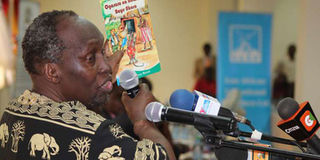Day Ngugi set Kisii afire with lecture

Prof. NgugiwaThiong'o shows a copy of a story book written in vernacular to members of the public and student who attended his public lecture at Kisii university on August 31, 2015. PHOTO | BENSON MOMANYI
What you need to know:
- Ngugi was obviously passionate about African languages. Just as he has done in his past lectures, he urged Kenyans, and indeed Africans at large, not to forget their languages. According to him, many civilisations world over preserved their cultures successfully through their local languages.
- Ngugi was witty and critical as he talked about his life in detention and how his only friend behind bars was ‘imagination’ which his jailers could not take away.
- Discussants during the lecture included Ngugi’s former students, Prof Chris Wanjala of the University of Nairobi and Moi University’s Prof Peter Amuka.
August 31 was a great day for Kisii University, when we hosted one Prof Ngugi wa Thiong’o, the renowned scholar and author and the main library was filled to capacity as thousands flocked to listen to his public lecture.
And Vice Chancellor Prof John Akama was at hand to introduce the great author. And when he finally stood, Prof Ngugi did not disappoint. He’d structured his talk to cover three important issues; the need for Africans to promote their languages, the need to recognise our heroes such as Otenyo and Koitalel arap Samoei and the need for Africans to be decolonised.
Ngugi was obviously passionate about African languages. Just as he has done in his past lectures, he urged Kenyans, and indeed Africans at large, not to forget their languages. According to him, many civilisations world over preserved their cultures successfully through their local languages.
Ngugi expressed disappointment with what he termed lack of commitment by Africans to promote their languages which he said are central in addressing the three issues he covered in his presentation.
PROUD PATRIOT
According to him, promoting local languages would not necessarily encourage negative ethnicity as many people claim. East African Educational Publishers chief executive Kiarie Kamau listed many books which Ngugi has written in his native Agikuyu language.
Despite having lived abroad for many years since going into exile, Ngugi has remained passionate about Kenya. His patriotism is obvious.
He ignited passion in the audience when he said the head of Otenyo, who led the Abagusii rebellion, be returned. Otenyo was beheaded by Mr Northcott, the colonial DC of Kisii District in 1908. He said the head of Koitalel Arap Samoei should also be brought back. “I am not amused that Kenyans have not been loud enough in demanding the heads Otenyo and Arap Samoei which remain in Britain years after independence. How far have we gone in demanding for the head of Otenyo? Otenyo was a national hero and should be honoured alongside Dedan Kimathi and others who stood against colonial oppression,” Ngugi told the audience.
Ngugi was witty and critical as he talked about his life in detention and how his only friend behind bars was ‘imagination’ which his jailers could not take away. He told us of how he used toilet paper while in prison to write two books which were published soon after he was released. Ngugi has published 40 books, two of which are based on his experiences in detention. He said his friendship with Raila Odinga was made stronger by Jaramogi Oginga Odinga who visited him at his Kamiirithu village home soon after he was released from detention. He said the visit surprised him but he also realised some friends did not forsake him.
And Raila Odinga, the Opposition chief, was also present during the lecture. Raila shared many jokes about his history with Ngugi going back to their days at the University of Nairobi where he briefly taught in the 1970s. He said Ngugi and himself hold ‘PG’ degrees, that is, Prison Graduate degrees. He said Ngugi’s prison diary made him survive detention.
Discussants during the lecture included Ngugi’s former students, Prof Chris Wanjala of the University of Nairobi and Moi University’s Prof Peter Amuka.
ACADEMIC MISSILES
They did good commentaries on Ngugi’s lecture but were not critical enough. Prof Wanjala shared about the changes that Ngugi brought in the curriculum of literature at the University of Nairobi while Prof Amuka talked about the good old days, when as students, they often took rides in Ngugi’s Peugeot 404 and would go to his house in Kamiriithu to drink muratina. Like Prof Wanjala, we did not see Amuka shoot academic missiles the way Ngugi did. The two scholars were timid and did little criticism.
Prof Ngugi suggested that we should go back to our local languages, paradoxically stating so in English. I know Ngugi tried this and wrote some of his books in Agikuyu language which did not make it to the best seller lists until they were translated to English.
My thinking is if we want to impact the world as Africans, then let us promote the use of language such as Kiswahili or any other that the African Union can agree on. We are living in a global village in which we must speak global languages to compete globally.




